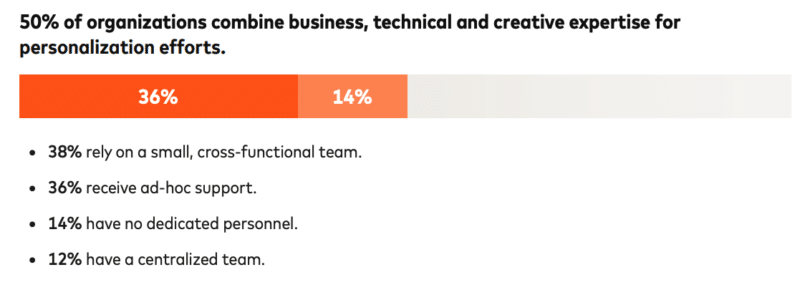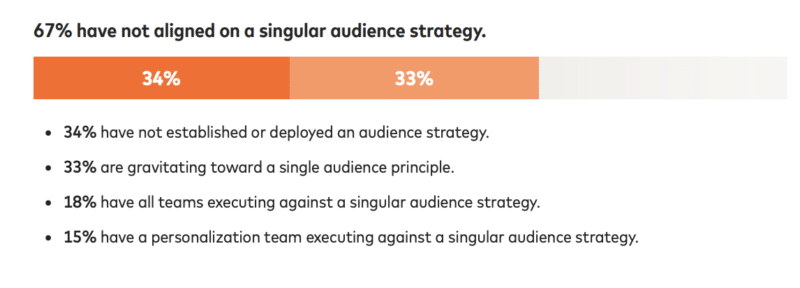
Over the next five years, there’s a $2 trillion opportunity for ecommerce brands that can effectively implement and scale personalization. Despite that, 50% of brands worldwide aren’t dedicating the resources to make this happen, according to a new report.
Mastercard’s “State of Personalization Maturity in Ecommerce” report also found surprising gaps in strategy and metrics in these organizations.
Most brands know personalization is important: 67% say it is a top priority and plan to invest more in it, according to the report. However, only 50% have dedicated personalization support, leaving the other half to rely on ad hoc resources or operate without them entirely.

“Without a centralized team, brands are forced to split time supporting personalization within separate functions of the organization, such as product management, merchandising or IT, making it harder for them to be truly dedicated and effective in their work,” the report states.
Dig deeper: 5 areas where businesses need to improve their customer experience
The lack of such a team makes it difficult to drive personalization efforts effectively across various groups and functions, potentially leading to stalled progress despite initial successes. “Greater resourcing becomes a true lever to scale,” note the report’s authors.
The lack of a unified strategy is also a problem, with 57% of brands worldwide saying they lack a singular audience strategy for approaching ideation, execution and analysis. Without that, personalization efforts are siloed, channel-specific (like optimizing only for email marketing), and less effective than a cross-functional, multichannel approach based on an aligned audience strategy.
Even though 66% use different data sources to fuel their personalization strategy and 67% consider audience strategy essential, the lack of a unified approach prevents brands from creating consistent and cohesive customer experiences across all touchpoints.
Lack of KPIs
Furthermore, measuring the impact of personalization efforts remains a significant challenge. More than half (55%) don’t have clear KPIs to measure personalization efforts explicitly. Instead, 40% still rely on conceptual KPIs (i.e., increased revenue, improved add-to-cart rate).

Without proper KPIs, personalization teams struggle to link their campaign metrics to larger business goals and, crucially, prove their work’s value. This lack of concrete measurement can then hinder further investment and long-term adoption.
Dig deeper: How AI can combat the ‘paradox of choice’ and improve customer outcomes
In the Americas, personalization and marketing generally have fewer resources to draw from. On the plus side, this means more collaboration between teams within the larger marketing function, making collecting and sharing data much easier. Unfortunately, it also means they lack the agility that comes from the autonomy of a centralized, independent personalization team. They can accomplish personalization-related tasks — even garnering greater nuance and insight as a result — but it holds them back from the increased skill level of specialization.
The report underscores that processes alone aren’t enough, stating, “Process without resource investment is progress without momentum.” While many companies have made strides in creating strong data analysis, testing and reporting processes, they need adequate staffing to execute and iterate effectively.
The survey was conducted in the Americas, Asia-Pacific, Europe and Middle East regions and “includes 92 responses from C-suite executives and individuals in marketing, merchandising, user experience (UX)/customer experience (CX), product management, analytics and development.” The full report can be found here (registration required).
The post Half of ecommerce brands lack the support to scale personalization effectively appeared first on MarTech.
